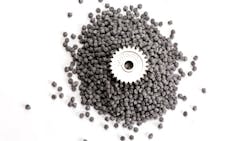A company that describes itself as a “rapid manufacturer” is inviting skeptics, to say the least: prospective customers are likely to cavil about how “rapid” their articles arrive, and competitors are bound to inquire about the reliability of the “manufacturing” methods. Nevertheless, there is an emerging breed of operations claiming that title, and implementing various production technologies to fulfill the claims.
More than that, rapid manufacturers are getting a lot of attention for the “disruption” they are creating in other industrial markets, metalcasting for one.
In the first half of this year, Proto Labs Inc. in Maple Plain, MN, has introduced two new materials for its metal-injection-molding operations, low-alloy steel and magnesium, expanding the range of its thixomolding operations (it also has additive manufacturing and CNC machining capabilities) and giving it new standing to compete with foundries and diecasters for precision parts contracts. Heated alloy feedstock “chips” are filled into the barrel of an injection molding press, and then delivered into a steel mold to form a part.
Proto Labs elevates its pitch by describing itself as an “online and technology-enabled quick-turn manufacturer of custom parts for prototyping and short-run production.”
The emphasis is on product delivery (“… custom prototypes and low-volume production parts in 15 days or less”), but there is production technology underlying the proposition.
In March, the company began offering injection-molded, low-alloy steel prototypes and low-volume production parts. It added two nickel steel materials (Catamold FN02, FN0205) and a chrome-moly material (Catamold 42CrMo4) that it described as the metal-injection molded equivalent of 4140 steel.
“We had tremendous customer demand for stainless steel with MIM last year,” according to Becky Cater, Proto Labs’ product manager for MIM, “and we expect the same response to our new low-alloy metals.
“We offer many different hard and soft metals through our 3D printing and CNC machining services” she said, “but nickel steel is only produced through metal injection molding.”
Low-alloy steel is a strong, wear-resistant material after heat-treating, and it can be coated to reduce corrosion or oxidation. Applications with weapons, sporting goods, and recreational products are expected to be quite strong. Automotive applications including engine and transmission parts are other possibilities, as are hand and power tools, door and window lock hardware, and an ongoing series of possibilities for industrial goods.
In July, Proto Labs introduced injection molding of magnesium AZ-91D to its rapid manufacturing menu, producing prototype parts and production quantities to 5,000 and above, typically with a 15-day turnaround.
“In recent years, lightweighting has become a significant factor in automotive product development, for example, as engineers are being tasked with drastically reducing vehicle weight in order to improve vehicle gas mileage,” Cater said. “We see magnesium injection molding as an important tool for achieving this.”
The new magnesium alloys adds another option to the dozens of materials that Proto Labs offers as injection molded parts, including thermoplastic and liquid silicone rubber as well as metal alloys. “Magnesium injection molding is yet another fast and cost-effective manufacturing method for Proto Labs’ customers to use as they race to quickly launch products to market,” she explained.
As long as speed is the factor that product designers and buyers emphasize, don’t expect rapid manufacturing developments to slow down.
